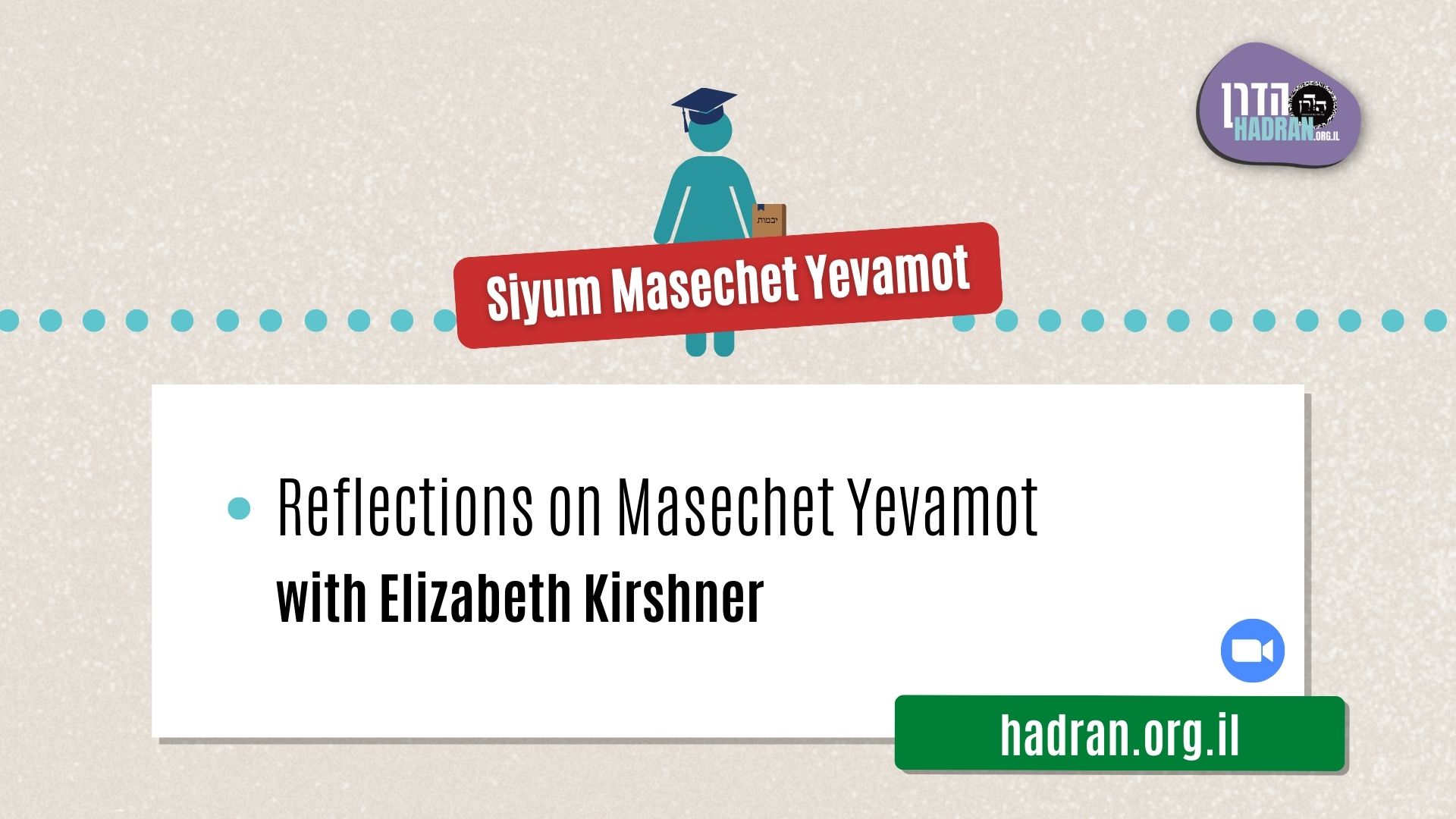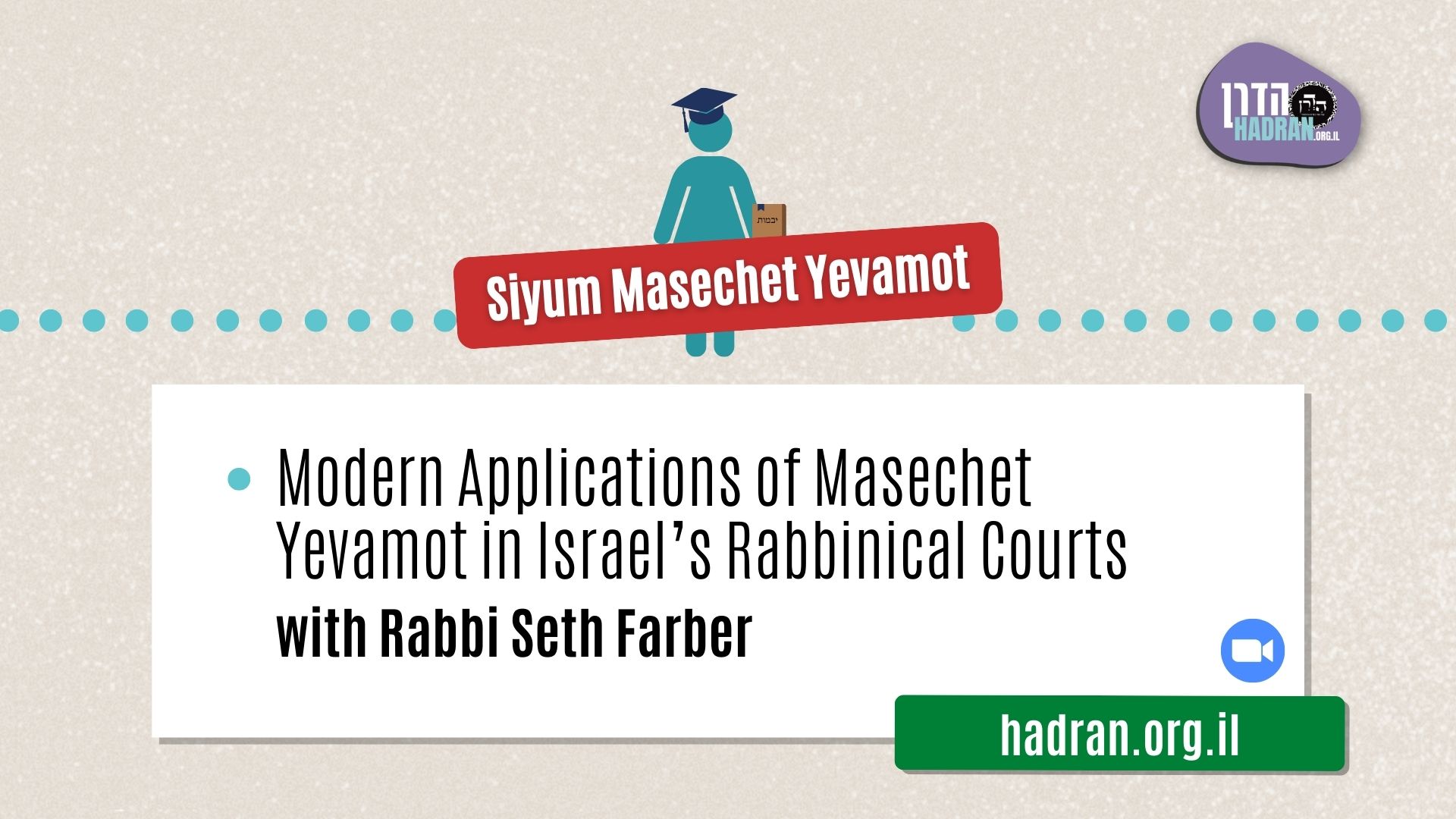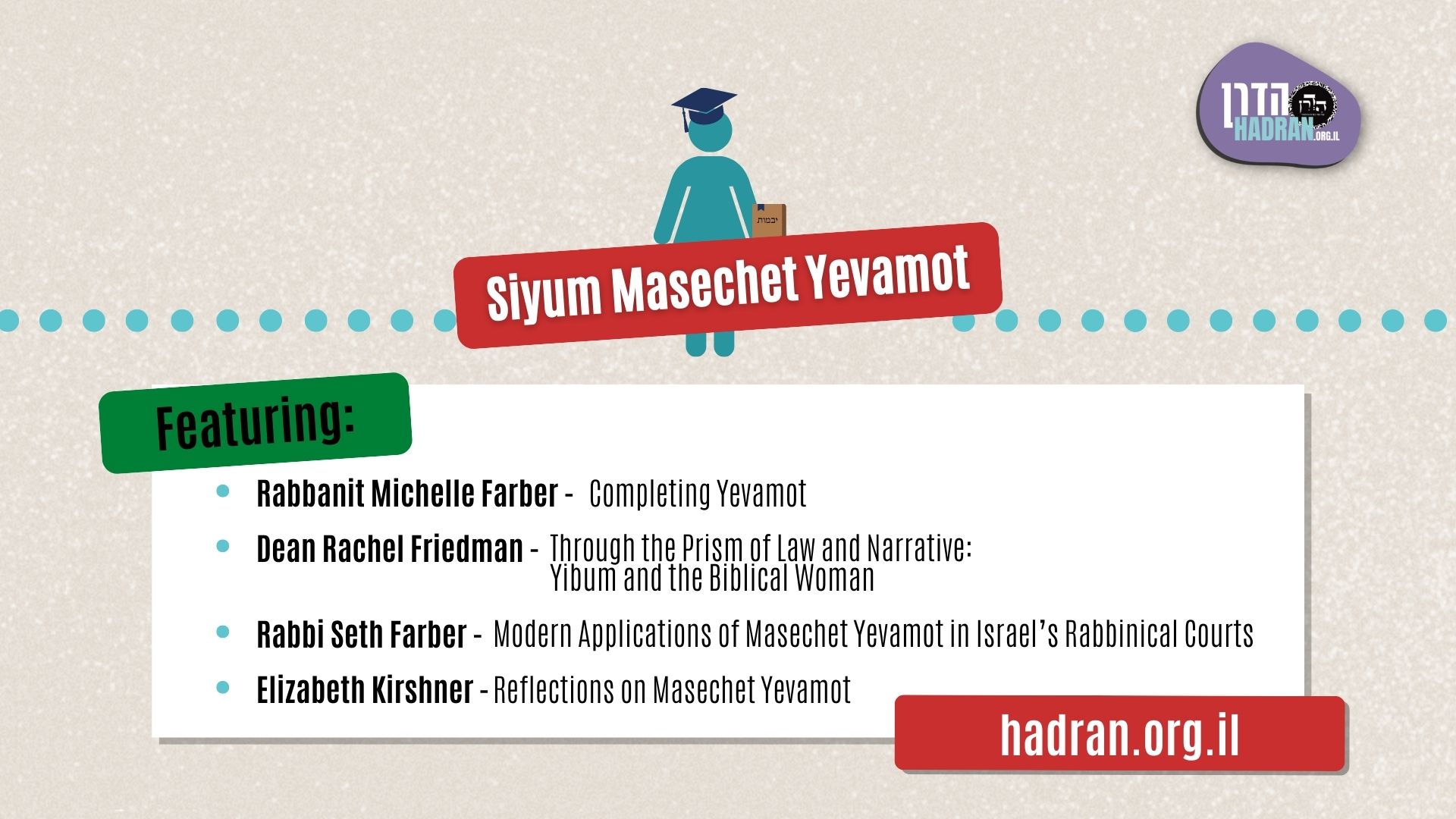Two different versions of Shmuel’s statement are brought regarding what case does a woman not need to wait three months before marrying. Is it regarding a Canaanite slave and a gentile who are minors or is referring to them, but over 12? If his statement is referring to older women, then one can infer that Jewish girls who are minors also do not have to wait three months and that it is regarding cases of znut, licentious relations. If so, why are we not concerned about gentile women engaging in licentious behavior? We assume they use birth control, as is found in the opinion of Rabbi Yosi. Why can we assume that? The Mishna mentioned that kohanot who were accidentally switched after the marriage are disqualified from the kehuna. What does this mean? The fourth chapter begins with a case where chalitza or yibum was performed and then they realized the woman was pregnant. Normally we wait three months before doing yibum or chalitza for this reason, but the Mishna discusses a case where they didn’t wait. If the baby does not survive, the chalitza or yibum was retroactively valid. If the baby survived, it is invalid and has no ramifications for forbidding relationships with each of their relatives. However, if yibum was performed, they will need separate (without divorce, as the marriage was invalid) and bring a sin offering. If it is unclear to whom the child belongs, we make the couple separate, the child is fine no matter what as either way was born to a legitimate father and the couple needs to bring a hanging guilt offering. Rabbi Yochanan and Reish Lakish debate about whether the woman needs to do chalitza again if she was pregnant when she did chalitza and the baby didn’t survive. Each explains their approach and questions are raised against each opinion from our Mishna.
Yevamot 35
Share this shiur:
This week’s learning is sponsored for the merit and safety of Haymanut (Emuna) Kasau, who was 9 years old when she disappeared from her home in Tzfat two years ago, on the 16th of Adar, 5784 (February 25, 2024), and whose whereabouts remain unknown.
This week’s learning is dedicated of the safety of our nation, the soldiers and citizens of Israel, and for the liberation of the Iranian people. May we soon see the realization of “ליהודים היתה אורה ושמחה וששון ויקר”.
Want to dedicate learning? Get started here:


Today’s daily daf tools:
This week’s learning is sponsored for the merit and safety of Haymanut (Emuna) Kasau, who was 9 years old when she disappeared from her home in Tzfat two years ago, on the 16th of Adar, 5784 (February 25, 2024), and whose whereabouts remain unknown.
This week’s learning is dedicated of the safety of our nation, the soldiers and citizens of Israel, and for the liberation of the Iranian people. May we soon see the realization of “ליהודים היתה אורה ושמחה וששון ויקר”.
Today’s daily daf tools:
Delve Deeper
Broaden your understanding of the topics on this daf with classes and podcasts from top women Talmud scholars.
New to Talmud?
Check out our resources designed to help you navigate a page of Talmud – and study at the pace, level and style that fits you.
The Hadran Women’s Tapestry
Meet the diverse women learning Gemara at Hadran and hear their stories.
Yevamot 35
וּגְזַרוּ רַבָּנַן קְטַנָּה מִשּׁוּם גְּדוֹלָה.
And, although there is no possibility for her to become pregnant, the Sages issued a rabbinic decree requiring the three month waiting period for a female minor due to this requirement for a female adult who engaged in promiscuous sexual acts.
וּמִי גָּזְרִינַן קְטַנָּה מִשּׁוּם גְּדוֹלָה? וְהָתְנַן: אִם הָיוּ קְטַנּוֹת שֶׁאֵינָן רְאוּיוֹת לֵילֵד — מַחְזִירִין אוֹתָן מִיָּד. אָמַר רַב גִּידֵּל אָמַר רַב: הוֹרָאַת שָׁעָה הָיְתָה. מִכְּלָל דַּהֲוַאי? אֶלָּא: כְּהוֹרָאַת שָׁעָה הָיְתָה. וְחִילּוּף לָא שְׁכִיחַ.
The Gemara asks: And do we issue a decree with regard to a female minor due to the ruling for a female adult? But didn’t we learn in the mishna: If they were female minors who could not bear children, we return them immediately to their husbands? This indicates that there is no concern for pregnancy, and the Sages did not issue a decree in this case. Rav Giddel said that Rav said: This was a provisional edict issued in exigent circumstances, and therefore one cannot extrapolate from the case in the mishna to other situations. The Gemara wonders: Can one assume by inference that there was such an occurrence? It would seem from the mishna that this was merely a possibility and not an actual occurrence, for if it actually happened it would have been appropriate for the mishna to relate the actual case. Rather, the ruling in the mishna is like a provisional edict in that switching of wives, such as described in the mishna, is uncommon, and in cases that are not common, the Sages do not issue a decree. Therefore, in the case of the mishna, the female minors were not required to wait.
לִישָּׁנָא אַחֲרִינָא, אָמְרִי לַהּ אָמַר שְׁמוּאֵל: כּוּלָּן צְרִיכוֹת לְהַמְתִּין שְׁלֹשָׁה חֳדָשִׁים, חוּץ מִגִּיּוֹרֶת וּמְשׁוּחְרֶרֶת גְּדוֹלָה. [אֲבָל] קְטַנָּה בַּת יִשְׂרָאֵל אֵינָהּ צְרִיכָה לְהַמְתִּין שְׁלֹשָׁה חֳדָשִׁים. בְּמַאי? אִי בְּמֵיאוּן — הָאַמְרַהּ שְׁמוּאֵל חֲדָא זִימְנָא. אִי בְּגֵט — הָא קָאָמַר שְׁמוּאֵל דְּבָעֲיָא! דְּאָמַר שְׁמוּאֵל: מֵיאֲנָה בּוֹ — אֵינָהּ צְרִיכָה לְהַמְתִּין שְׁלֹשָׁה חֳדָשִׁים! נָתַן לָהּ גֵּט — צְרִיכָה לְהַמְתִּין שְׁלֹשָׁה חֳדָשִׁים! אֶלָּא בִּזְנוּת, וּזְנוּת בִּקְטַנָּה לָא שְׁכִיחַ.
Some say another version of what was taught: Shmuel said: All women must wait three months, except for a female convert who is an adult and a freed maidservant who is an adult; these women need not wait. However, an Israelite female minor need not wait three months in any case. The Gemara clarifies: With regard to what situation is this statement referring? If it is referring to a female minor released from her marriage by refusal, it would be superfluous, as didn’t Shmuel already state this halakha one time? If it is referring to a woman released by a bill of divorce, but didn’t Shmuel say that in that case she is required to wait, as Shmuel said: If she refused him she need not wait three months, but if he gave her a bill of divorce, she must wait three months? Rather, this is referring to cases of promiscuous sexual intercourse, and an occurrence of promiscuous sexual intercourse with female minors is uncommon, and the Sages did not issue rabbinic decrees in uncommon instances.
גִּיּוֹרֶת וּמְשׁוּחְרֶרֶת דִּשְׁכִיחַ בְּהוּ זְנוּת, לִיגְזוֹר! הוּא דְּאָמַר כְּרַבִּי יוֹסֵי. דְּתַנְיָא: הַגִּיּוֹרֶת וְהַשְּׁבוּיָה וְהַשִּׁפְחָה שֶׁנִּפְדּוּ וְשֶׁנִּתְגַּיְּירוּ וְשֶׁנִּשְׁתַּחְרְרוּ — צְרִיכוֹת לְהַמְתִּין שְׁלֹשָׁה חֳדָשִׁים, דִּבְרֵי רַבִּי יְהוּדָה. רַבִּי יוֹסֵי מַתִּיר לֵיאָרֵס וְלִינָּשֵׂא מִיָּד. אָמַר רַבָּה: מַאי טַעְמָא דְּרַבִּי יוֹסֵי — קָסָבַר אִשָּׁה מְזַנָּה מְשַׁמֶּשֶׁת בְּמוֹךְ כְּדֵי שֶׁלֹּא תִּתְעַבֵּר.
The Gemara suggests: Let the Sages issue a decree requiring a female convert and a released maidservant to wait three months, as at the time that one was a gentile and the other a maidservant, promiscuous sexual intercourse was common for them. The Gemara responds: Shmuel stated his halakhic ruling in accordance with the opinion of Rabbi Yosei, as it is taught in a baraita: In the case of the female convert; and the captured woman, who is suspected of having been raped during her imprisonment; and the maidservant, who were redeemed or who were converted or who were released, must wait three months prior to marriage. This is the statement of Rabbi Yehuda. Rabbi Yosei allows them to be betrothed and married immediately. Rabba said: What is the reasoning of Rabbi Yosei? He holds that a woman who engages in promiscuous sexual intercourse uses a contraceptive resorbent that she places at the opening of her womb so as not to become impregnated. Therefore, there is no concern that she might be pregnant.
אֲמַר לֵיהּ אַבָּיֵי: בִּשְׁלָמָא גִּיּוֹרֶת, כֵּיוָן דְּדַעְתַּהּ לְאִיגַּיּוֹרֵי, מְנַטְּרָה נַפְשַׁהּ, כְּדֵי לְהַבְחִין בֵּין זֶרַע שֶׁנִּזְרַע בִּקְדוּשָּׁה, וּבֵין זֶרַע שֶׁנִּזְרַע שֶׁלֹּא בִּקְדוּשָּׁה. שְׁבוּיָה וְשִׁפְחָה נָמֵי, דְּשָׁמְעִי מִמָּרַיְיהוּ, וּמְנַטְּרִי נַפְשַׁיְיהוּ. אֶלָּא יוֹצֵאת בְּשֵׁן וָעַיִן הֵיכִי מַשְׁכַּחַתְּ לַהּ?
Abaye said to him: Granted, a female convert does this. Since she is determined to convert, she guards herself so as not to be impregnated while still a gentile in order to distinguish between children conceived in sanctity, i.e., after her conversion, and children conceived out of sanctity. A captured woman and a maidservant would also be cautious because they hear from their masters that they are about to be redeemed or that they are about to be released, and they guard themselves so as not to be impregnated. However, with regard to a maidservant who is released due to damage caused her by her masters, i.e., loss of one of her extremities such as a tooth or an eye, how can you find a case where there is no concern for her becoming impregnated? Since she could not have known in advance that she would be released, she would have had no reason to be careful not to become pregnant.
וְכִי תֵּימָא: כֹּל דְּמִמֵּילָא מוֹדֶה רַבִּי יוֹסֵי — וְהָתְנַן: אֲנוּסָה וּמְפוּתָּה צְרִיכָה לְהַמְתִּין שְׁלֹשָׁה חֳדָשִׁים, דִּבְרֵי רַבִּי יְהוּדָה. רַבִּי יוֹסֵי מַתִּיר לֵיאָרֵס וְלִינָּשֵׂא מִיָּד.
And if you would say that in any case where the situation occurs by itself, as in the case where a woman was unaware of her pending release, Rabbi Yosei concedes that she must indeed wait, this is difficult. But didn’t we learn in a mishna: A woman who was raped and a woman who was seduced must wait three months as perhaps she became pregnant; this is the statement of Rabbi Yehuda. Rabbi Yosei permits her to be betrothed and to be married immediately. Clearly, a woman who was raped could not have prepared herself ahead of time so as not to become pregnant.
אֶלָּא אָמַר אַבָּיֵי: אִשָּׁה מְזַנָּה, מִתְהַפֶּכֶת שֶׁלֹּא תִּתְעַבֵּר. וְאִידַּךְ? חָיְישִׁינַן שֶׁמָּא לֹא נִתְהַפְּכָה יָפֶה יָפֶה.
Rather, Abaye said: A woman who engages in promiscuous sexual intercourse turns over following intercourse, trying to prevent the absorption of the semen, so as not to become pregnant. Maidservants act in a similar manner. The Gemara asks: If indeed she tries not to become pregnant, how then would the other opinion, that of Rabbi Yehuda, explain why she must wait three months? The Gemara responds: We are concerned that perhaps she did not turn over well enough and therefore became pregnant.
וְאִם הָיוּ כֹּהֲנוֹת כּוּ׳. כֹּהֲנוֹת — אִין, יִשְׂרְאֵלִיּוֹת — לָא! אֵימָא: אִם הָיוּ נְשֵׁי כֹהֲנִים. נְשֵׁי כֹהֲנִים — אִין, נְשֵׁי יִשְׂרְאֵלִים — לָא.
§ With regard to the case of two betrothed women who were switched at the time they entered the wedding canopy, the mishna states: And if they were daughters of priests, they are disqualified from partaking in teruma. The Gemara asks: Does this indicate that with regard to the daughters of priests, yes, they are disqualified from partaking in teruma, but with regard to the daughter of an Israelite, no, she would not be disqualified? It would seem that an Israelite woman married to a priest should most certainly be disqualified from eating of her husband’s teruma. The Gemara answers: Rather, say: If they were the wives of priests then they are disqualified. The Gemara questions this formulation: Does this indicate that with regard to the wives of priests, yes, they are disqualified, but with regard to the wives of Israelites, no, they are not disqualified, and if their husbands died, they would be suitable for marriage to the priests?
וְהָאָמַר רַב עַמְרָם: הָא מִילְּתָא אֲמַר לַן רַב שֵׁשֶׁת, וְאַנְהֲרִינְהוּ לְעַיְינִין מִמַּתְנִיתִין: אֵשֶׁת יִשְׂרָאֵל שֶׁנֶּאֶנְסָה, אַף עַל פִּי שֶׁמּוּתֶּרֶת לְבַעְלָהּ — פְּסוּלָה לַכְּהוּנָּה.
The Gemara objects to this: But didn’t Rav Amram say: Rav Sheshet said this matter to us, and he lit our eyes by showing us that this ruling is indicated from what was stated in the mishna (Yevamot 53b). He said: The wife of an Israelite who was raped, even though she is permitted to return to her husband, she is nevertheless disqualified from the priesthood. If her husband later dies, she may not marry a priest, for although she is permitted to her husband the rape disqualified her for matters of priesthood.
אָמַר רָבָא, הָכִי קָאָמַר: אִם הָיוּ כֹּהֲנוֹת נְשׂוּאוֹת לְיִשְׂרָאֵל — נִפְסְלוּ מִן הַתְּרוּמָה דְּבֵי נָשַׁיְיהוּ.
Rava resolved this and said: This is what the tanna is saying in the mishna: If they were daughters of priests who were married to an Israelite, they are disqualified from the teruma that is from the household of their fathers, so that if their husbands die while they are childless, they may not go back to eat of the teruma in the house of their fathers. While other childless daughters of priests are again qualified to eat of the teruma the moment they leave their Israelite husbands, these women were disqualified by their act of forbidden sexual intercourse.
הֲדַרַן עֲלָךְ אַרְבָּעָה אַחִין
MISHNA: When a man who has a brother dies childless, his widow [yevama] and one of his brothers [yavam] may perform a ritual through which she is freed of her levirate bonds [ḥalitza]. It is then considered, with regard to forbidden relationships, as though they had been married and divorced. Therefore, he is forbidden to her relatives, and she to his. However, with regard to one who performs ḥalitza with his yevama and then she is found to have been pregnant at the time of the ḥalitza and she gave birth, in the event that the offspring is viable, the deceased husband has been survived by offspring and so there was never any levirate bond; consequently, the ḥalitza that was performed was entirely unnecessary and a meaningless act. As such, he remains permitted to her relatives and she remains permitted to his relatives. Furthermore, since the ḥalitza was meaningless, she is not afforded the status of a ḥalutza, i.e., a yevama who performed ḥalitza, a status akin to that of a divorcée. Therefore, the ḥalitza does not disqualify her from marrying into the priesthood.
הַחוֹלֵץ לִיבִמְתּוֹ וְנִמְצֵאת מְעוּבֶּרֶת וְיָלְדָה, בִּזְמַן שֶׁהַוָּלָד שֶׁל קַיָּימָא — הוּא מוּתָּר בִּקְרוֹבוֹתֶיהָ, וְהִיא מוּתֶּרֶת בִּקְרוֹבָיו, וְלֹא פְּסָלָהּ מִן הַכְּהוּנָּה.
If the offspring is not viable, then it emerges that the ḥalitza was indeed necessary. Therefore, he is forbidden to engage in relations with her relatives and she is forbidden to engage in relations with his relatives, as though they had been married and divorced, and the ḥalitza disqualifies her from marrying into the priesthood, as she is afforded the status of a ḥalutza.
אֵין הַוָּלָד שֶׁל קַיָּימָא — הוּא אָסוּר בִּקְרוֹבוֹתֶיהָ, וְהִיא אֲסוּרָה בִּקְרוֹבָיו, וּפְסָלָהּ מִן הַכְּהוּנָּה.
With regard to one who consummates the levirate marriage with his yevama, i.e., he had intercourse with her under the assumption that there is a levirate bond and so there is a mitzva to do so, and then she is found to have been pregnant at the time of the intercourse and she gave birth, in the event that the offspring is viable the deceased brother has been survived by offspring and it is evident that there was never any levirate bond. In that case, the relations they had, rather than being a mitzva, were a violation of the prohibition against engaging in relations with one’s brother’s wife. Therefore, the yavam must send her out, i.e., they must separate, as she is forbidden to him as his brother’s wife, and to atone for the forbidden relations that they had, they are each obligated to bring a sin-offering, as is the halakha for all who inadvertently transgress a prohibition that, when performed intentionally, is punishable by karet.
הַכּוֹנֵס אֶת יְבִמְתּוֹ וְנִמְצֵאת מְעוּבֶּרֶת וְיָלְדָה, בִּזְמַן שֶׁהַוָּלָד שֶׁל קַיָּימָא — יוֹצִיא, וְחַיָּיבִין בְּקׇרְבָּן.
And if the offspring is not viable, and therefore there was in fact a levirate bond, he may maintain her as his wife since his intercourse with her was a valid consummation of levirate marriage.
וְאִם אֵין וָלָד שֶׁל קַיָּימָא — יְקַיֵּים.
If they consummated the levirate marriage and seven months later she gave birth, there is uncertainty whether the child is nine months old, i.e., counting from conception, and is the offspring of the first husband, and as such there was no levirate bond, or whether the child is only seven months old and is the offspring of the latter husband, i.e., the yavam, and not of the deceased, in which case there was a levirate bond. In that case, due to the possibility that she is forbidden to him as his brother’s wife, he must send her out. However, the lineage of the child is unflawed, since regardless of whether it was born of the first or second husband, there was no transgression involved in its conception. Furthermore, to atone for the possibility that they had forbidden relations they are both obligated to bring a guilt-offering for uncertainty, as is the halakha for anyone who is uncertain whether they inadvertently transgressed a prohibition that would require one to bring a sin-offering.
סָפֵק בֶּן תִּשְׁעָה לָרִאשׁוֹן, סָפֵק בֶּן שִׁבְעָה לָאַחֲרוֹן — יוֹצִיא, וְהַוָּלָד כָּשֵׁר. וְחַיָּיבִין בְּאָשָׁם תָּלוּי.
GEMARA: An amoraic dispute was stated with regard to one who performs ḥalitza with a pregnant woman and she later miscarried. Since she miscarried, she was certainly bound to the yavam by a levirate bond and may not marry anyone else; rather, she is obligated to consummate the levirate marriage or perform ḥalitza. The question is whether the ḥalitza that was performed while she was still pregnant is effective in releasing her from the levirate bond. Rabbi Yoḥanan said: She does not require another ḥalitza from the brothers. Reish Lakish said: She requires another ḥalitza from the brothers.
גְּמָ׳ אִיתְּמַר: הַחוֹלֵץ לִמְעוּבֶּרֶת וְהִפִּילָה, רַבִּי יוֹחָנָן אָמַר: אֵינָהּ צְרִיכָה חֲלִיצָה מִן הָאַחִין. רֵישׁ לָקִישׁ אָמַר: צְרִיכָה חֲלִיצָה מִן הָאַחִין.
The Gemara elaborates: Rabbi Yoḥanan said that she does not require another ḥalitza from the brothers because he holds: Ḥalitza performed with a pregnant woman who later miscarries is considered effective ḥalitza in order to release her from the levirate bond. And similarly, intercourse with a pregnant woman who later miscarries is considered a valid consummation of levirate marriage through intercourse, such that she and the yavam are considered to be married. And Reish Lakish said she requires another ḥalitza from the brothers because he holds: Ḥalitza performed with a pregnant woman is not considered effective ḥalitza, and intercourse with a pregnant woman is not considered a valid consummation of levirate marriage through intercourse. Therefore, after she miscarries, another ḥalitza must be performed in order to release her from the levirate bond.
רַבִּי יוֹחָנָן אָמַר: אֵינָהּ צְרִיכָה חֲלִיצָה מִן הָאַחִין, חֲלִיצַת מְעוּבֶּרֶת — שְׁמָהּ חֲלִיצָה, וּבִיאַת מְעוּבֶּרֶת — שְׁמָהּ בִּיאָה. וְרֵישׁ לָקִישׁ אָמַר: צְרִיכָה חֲלִיצָה מִן הָאַחִין, חֲלִיצַת מְעוּבֶּרֶת — לֹא שְׁמָהּ חֲלִיצָה, וּבִיאַת מְעוּבֶּרֶת — לֹא שְׁמָהּ בִּיאָה.
With regard to what principle do they disagree? If you wish, say that they disagree over the interpretation of a verse. And if you wish, say that they disagree on a point of logical reasoning.
בְּמַאי קָמִפַּלְגִי? אִיבָּעֵית אֵימָא קְרָא, וְאִיבָּעֵית אֵימָא סְבָרָא.
If you wish, say that that they disagree over a point of logical reasoning in that Rabbi Yoḥanan holds: If Elijah the prophet were to come at the moment of the ḥalitza and say that this woman who is pregnant will miscarry, is she not eligible for ḥalitza or levirate marriage, even though she is currently pregnant, since her husband died and will not be survived by offspring? Now, too, even though when the ḥalitza or levirate marriage is performed it is not known whether or not she will miscarry, the matter will be revealed retroactively, i.e., if she ultimately miscarries then it is apparent the ḥalitza or levirate marriage was always necessary and is therefore valid.
אִיבָּעֵית אֵימָא סְבָרָא, רַבִּי יוֹחָנָן סָבַר: אִם יָבֹא אֵלִיָּהוּ וְיֹאמַר דְּהָא דְּאִיעַבַּרָא אַפּוֹלֵי מַפְּלָה, מִי לָאו בַּת חֲלִיצָה וְיִבּוּם הִיא? הַשְׁתָּא נָמֵי תִּגַּלֵּי מִילְּתָא לְמַפְרֵעַ.
And Reish Lakish said: We do not say that the matter will be revealed retroactively in order to validate the levirate marriage or ḥalitza. Since at the time of the levirate marriage or ḥalitza it was still unknown whether she would miscarry, the act is considered premature and ineffective.
וְרֵישׁ לָקִישׁ אָמַר: תִּגַּלֵּי מִילְּתָא לְמַפְרֵעַ לָא אָמְרִינַן.
And if you wish, say that they disagree over the interpretation of a verse in that Rabbi Yoḥanan holds: The Merciful One states in the Torah: “If brothers dwell together, and one of them dies, and he has no child” (Deuteronomy 25:5), i.e., the obligation to consummate a levirate marriage or perform ḥalitza applies whenever a husband dies and is not survived by offspring. And this man, whose wife is currently pregnant, does not have any children who will survive him. Therefore, there is an obligation to consummate a levirate marriage or perform ḥalitza, and if done, they will be effective. And Reish Lakish holds: The phrase “and he has no [ein] child” is expounded by the Sages to teach that one should inspect [ayein] him carefully to determine if he is survived by offspring of any form, and currently he is in fact survived by the fetus. Therefore, there is currently no obligation to consummate a levirate marriage or perform ḥalitza, and consequently, even if done, they are ineffective.
וְאִיבָּעֵית אֵימָא קְרָא, רַבִּי יוֹחָנָן סָבַר: ״וּבֵן אֵין לוֹ״ אָמַר רַחֲמָנָא, וְהָא לֵית לֵיהּ. וְרֵישׁ לָקִישׁ סָבַר: ״וּבֵן אֵין לוֹ״ — עַיֵּין עָלָיו.
Rabbi Yoḥanan raised an objection to the opinion of Reish Lakish from the mishna: If ḥalitza was performed with a pregnant woman, and the offspring is not viable, then he is forbidden to her relatives and she is forbidden to his relatives, and the ḥalitza disqualifies her from the priesthood. Rabbi Yoḥanan explains the challenge: Granted, according to my opinion, as I say that ḥalitza performed with a pregnant woman who later miscarries is considered effective ḥalitza, it is due to that reason that the ḥalitza disqualifies her from the priesthood. However, according to your opinion, as you say that ḥalitza performed with a pregnant woman is not considered effective ḥalitza, why should the ḥalitza disqualify her from the priesthood? According to your opinion, shouldn’t the ḥalitza be entirely disregarded?
אֵיתִיבֵיהּ רַבִּי יוֹחָנָן לְרֵישׁ לָקִישׁ: אֵין הַוָּלָד שֶׁל קַיָּימָא — הוּא אָסוּר בִּקְרוֹבוֹתֶיהָ, וְהִיא אֲסוּרָה בִּקְרוֹבָיו, וּפְסָלָהּ מִן הַכְּהוּנָּה. בִּשְׁלָמָא לְדִידִי, דְּאָמֵינָא חֲלִיצַת מְעוּבֶּרֶת שְׁמָהּ חֲלִיצָה — מִשּׁוּם הָכִי פָּסְלָה, אֶלָּא לְדִידָךְ, דְּאָמְרַתְּ חֲלִיצַת מְעוּבֶּרֶת לֹא שְׁמָהּ חֲלִיצָה, אַמַּאי פָּסְלָה מִן הַכְּהוּנָּה?
Reish Lakish said to Rabbi Yoḥanan: Indeed, by Torah law the ḥalitza is to be entirely disregarded. The mishna’s ruling that she is disqualified from the priesthood is by rabbinic decree and is merely a stringency lest people not realize that she was pregnant and think that a ḥalutza is permitted to marry a priest.
אֲמַר לֵיהּ: מִדְּרַבָּנַן, וּלְחוּמְרָא בְּעָלְמָא.
There are those who say an alternate version of the dispute: Reish Lakish raised an objection to the opinion of Rabbi Yoḥanan from the mishna: If ḥalitza was performed with a pregnant woman and the offspring is not viable, then he is forbidden to her relatives and she is forbidden to his relatives, and the ḥalitza disqualifies her from the priesthood. Reish Lakish explains the challenge: Granted, according to my opinion, as I say that ḥalitza performed with a pregnant woman is not considered effective ḥalitza, this is consistent with that which is taught in the mishna: The ḥalitza disqualifies her from the priesthood, which should be understood as a rabbinic stringency, and it is understandable that the mishna does not teach: She does not require another ḥalitza from the brothers, because according to my opinion, once she miscarries, she does indeed require another ḥalitza from the brothers.
אִיכָּא דְּאָמְרִי: אֵיתִיבֵיהּ רֵישׁ לָקִישׁ לְרַבִּי יוֹחָנָן: אֵין הַוָּלָד שֶׁל קַיָּימָא — הוּא אָסוּר בִּקְרוֹבוֹתֶיהָ, וְהִיא אֲסוּרָה בִּקְרוֹבָיו, וּפְסָלָהּ מִן הַכְּהוּנָּה. בִּשְׁלָמָא לְדִידִי, דְּאָמֵינָא חֲלִיצַת מְעוּבֶּרֶת לֹא שְׁמָהּ חֲלִיצָה, הַיְינוּ דְּקָתָנֵי ״פְּסָלָהּ מִן הַכְּהוּנָּה״ — לְחוּמְרָא, וְלָא קָתָנֵי ״אֵינָהּ צְרִיכָה חֲלִיצָה מִן הָאַחִין״.
However, according to your opinion that ḥalitza performed with a pregnant woman is an effective ḥalitza, the mishna should have taught the full extent of her permissible status, i.e., that she does not even require another ḥalitza from the brothers after she miscarries because the original ḥalitza was effective. Rabbi Yoḥanan said to Reish Lakish: Yes, it is indeed so that she does not require another ḥalitza from the brothers, but since the first clause taught: The ḥalitza does not disqualify her from the priesthood, therefore the latter clause taught: The ḥalitza disqualifies her from the priesthood, in order to directly contrast with the first clause rather than teach the greater novelty.
אֶלָּא לְדִידָךְ, ״אֵינָהּ צְרִיכָה חֲלִיצָה מִן הָאַחִין״ מִיבְּעֵי לֵיהּ! אֲמַר לֵיהּ: אִין הָכִי נָמֵי. וְאַיְּידֵי דִּתְנָא רֵישָׁא ״לֹא פְּסָלָהּ״ — תְּנָא [נָמֵי] סֵיפָא ״פְּסָלָהּ״.
Rabbi Yoḥanan raised an objection to the opinion of Reish Lakish from the mishna: If a yavam had intercourse with his yevama, who was pregnant, and the offspring is not viable, and therefore she was bound by a levirate bond, he may maintain her as his wife. Rabbi Yoḥanan explains the challenge: Granted, according to my opinion, as I say ḥalitza performed with a pregnant woman is considered effective ḥalitza, and similarly, intercourse with a pregnant woman is considered a valid consummation of levirate marriage through intercourse, it is due to that reason that the mishna teaches: He may maintain her as his wife, because the levirate marriage was indeed valid.
אֵיתִיבֵיהּ רַבִּי יוֹחָנָן לְרֵישׁ לָקִישׁ: אֵין הַוָּלָד שֶׁל קַיָּימָא — יְקַיֵּים. בִּשְׁלָמָא לְדִידִי, דְּאָמֵינָא חֲלִיצַת מְעוּבֶּרֶת — שְׁמָהּ חֲלִיצָה, וּבִיאַת מְעוּבֶּרֶת — שְׁמָהּ בִּיאָה, מִשּׁוּם הָכִי קָתָנֵי ״יְקַיֵּים״.
However, according to your opinion, as you said that ḥalitza performed with a pregnant woman is not considered effective ḥalitza, and intercourse with a pregnant woman is not considered a valid consummation of levirate marriage through intercourse, the mishna should have taught that he should proceed to engage in intercourse with her again in order to consummate the levirate marriage and only then may he maintain her as his wife. Reish Lakish responded: What is the intention of the mishna when it teaches: He may maintain her as his wife? Perforce it means that he should proceed to engage in intercourse again with her and then he may maintain her as his wife, as any other way is insufficient to release her from the levirate bond. Therefore, it is unnecessary for the mishna to teach this explicitly.
אֶלָּא לְדִידָךְ, דְּאָמְרַתְּ חֲלִיצַת מְעוּבֶּרֶת — לֹא שְׁמָהּ חֲלִיצָה, וּבִיאַת מְעוּבֶּרֶת — לֹא שְׁמָהּ בִּיאָה, ״יַחְזוֹר וְיִבְעוֹל וִיקַיֵּים״ מִיבְּעֵי לֵיהּ! מַאי ״יְקַיֵּים״ — יַחְזוֹר וְיִבְעוֹל וִיקַיֵּים, דְּלָא סַגִּי.
There are those who say an alternate version of the dispute: Reish Lakish raised an objection to the opinion of Rabbi Yoḥanan from the mishna: If a yavam had intercourse with his yevama, who was pregnant, and the offspring is not viable, and therefore she was bound by a levirate bond, he may maintain her as his wife. Reish Lakish explains how the mishna poses a challenge to Rabbi Yoḥanan’s opinion: Granted, according to my opinion, as I say that ḥalitza performed with a pregnant woman is not considered effective ḥalitza, and intercourse with a pregnant woman is not considered a valid consummation of levirate marriage through intercourse, this is consistent with that which is taught in the mishna: He may maintain her as a wife, which perforce means he should proceed to engage in intercourse with her again and then he may maintain her as his wife, as any other way is insufficient to release her from the levirate bond without this additional intercourse.
אִיכָּא דְּאָמְרִי: אֵיתִיבֵיהּ רֵישׁ לָקִישׁ לְרַבִּי יוֹחָנָן: אֵין הַוָּלָד שֶׁל קַיָּימָא — יְקַיֵּים. בִּשְׁלָמָא לְדִידִי, דְּאָמֵינָא חֲלִיצַת מְעוּבֶּרֶת — לֹא שְׁמָהּ חֲלִיצָה, וּבִיאַת מְעוּבֶּרֶת — לֹא שְׁמָהּ בִּיאָה, הַיְינוּ דְּקָתָנֵי ״יְקַיֵּים״, ״יַחְזוֹר וְיִבְעוֹל וִיקַיֵּים״, דְּלָא סַגִּי בְּלָאו הָכִי,
However, according to your opinion that intercourse with a pregnant woman is considered a valid consummation of levirate marriage and therefore she is certainly considered to be his wife, the mishna should have taught: If he wishes he may send her out, through divorce, or if he wishes he may maintain her as a wife. Rabbi Yoḥanan replied: Yes, it is indeed so, but since the first clause taught: He should send her out, therefore the latter clause taught: He may maintain her as a wife, in order to directly contrast the first clause, rather than teach the full halakha with all its details.
אֶלָּא לְדִידָךְ — ״רָצָה יוֹצִיא, רָצָה יְקַיֵּים״ מִיבְּעֵי לֵיהּ! אִין הָכִי נָמֵי, אַיְּידֵי דִּתְנָא רֵישָׁא ״יוֹצִיא״, תְּנָא נָמֵי סֵיפָא ״יְקַיֵּים״.
The Gemara raises an objection to the opinion of Rabbi Yoḥanan from a baraita: In the case of one who consummates the levirate marriage with his yevama, and he does so under the assumption that there is a levirate bond and he is obligated to consummate a levirate marriage with her, and then she is found to have been pregnant at the time of the intercourse, a rival wife of this yevama may not marry, lest the offspring be viable. Before explaining the challenge, the Gemara notes that the reasoning of the baraita appears flawed: On the contrary, when the offspring is viable, that is a reason for her rival wife to be released from the levirate bond, and she should be able to marry any man. Rather, emend the baraita and say: Lest the offspring not be viable.
מֵיתִיבִי: הַכּוֹנֵס אֶת יְבִמְתּוֹ וְנִמְצֵאת מְעוּבֶּרֶת — הֲרֵי זוֹ לֹא תִּנָּשֵׂא צָרָתָהּ, שֶׁמָּא יְהֵא וְלָד בֶּן קַיָּימָא. אַדְּרַבָּה, כִּי הָוֵי הַוָּלָד בֶּן קַיָּימָא, מִיפַּטְרָה צָרָתָהּ! אֶלָּא אֵימָא: שֶׁמָּא לֹא יְהֵא הַוָּלָד בֶּן קַיָּימָא.
The Gemara now explains how the baraita poses a challenge to Rabbi Yoḥanan’s opinion: And if it enters your mind to say that intercourse with a pregnant woman is considered a valid consummation of levirate marriage through intercourse, why should her rival wife not be permitted to marry? Indeed, her rival wife should be released from the levirate bond by virtue of the intercourse of her fellow wife. If the deceased had several rival wives, all of them become bound by the levirate bond. However, it is sufficient for one of them to either consummate a levirate marriage or perform ḥalitza in order to release the rest of them from their bond and thereby permit them to marry any man.
וְאִי סָלְקָא דַּעְתָּךְ בִּיאַת מְעוּבֶּרֶת שְׁמָהּ בִּיאָה, אַמַּאי לֹא תִּנָּשֵׂא צָרָתָהּ? תִּיפְּטַר בְּבִיאָה שֶׁל חֲבֶירְתָּהּ!
The Gemara defends Rabbi Yoḥanan’s opinion: Abaye said that the opinion ascribed to Rabbi Yoḥanan above is not an accurate portrayal of his opinion. Rather, with regard to intercourse with a yevama who is pregnant at the time, everyone agrees that it does not release her and her rival wives from the levirate bond; when they disagree it is only with regard to whether ḥalitza performed with a yevama who is pregnant at the time is effective in releasing her and her rival wives from the levirate bond.
אָמַר אַבָּיֵי: בְּבִיאָה כּוּלֵּי עָלְמָא לָא פְּלִיגִי דְּלָא פָּטְרָה, כִּי פְּלִיגִי בַּחֲלִיצָה.
Abaye continues to explain his opinion: Rabbi Yoḥanan holds that ḥalitza with a pregnant woman is considered effective ḥalitza, but intercourse with a pregnant woman is not considered a valid consummation of levirate marriage through intercourse and therefore does not release her and her rival wives from the levirate bond. And Reish Lakish holds that intercourse with a pregnant woman is not considered a valid consummation of levirate marriage through intercourse, and ḥalitza with a pregnant woman is not considered effective ḥalitza. Therefore, the baraita cited above does not pose a challenge, since all agree that intercourse with a pregnant woman will not free her or her rival wives from the levirate bond.
רַבִּי יוֹחָנָן סָבַר: חֲלִיצַת מְעוּבֶּרֶת — שְׁמָהּ חֲלִיצָה, בִּיאַת מְעוּבֶּרֶת — לֹא שְׁמָהּ בִּיאָה. רֵישׁ לָקִישׁ סָבַר: בִּיאַת מְעוּבֶּרֶת לֹא שְׁמָהּ בִּיאָה, וַחֲלִיצַת מְעוּבֶּרֶת לֹא שְׁמָהּ חֲלִיצָה.
Rava said to him: Whichever way you look at it, one cannot differentiate between the validity of consummating the levirate marriage through intercourse and the validity of ḥalitza. If intercourse with a pregnant woman is considered a valid consummation of levirate marriage through intercourse because if she miscarries it is apparent that there was always an obligation to perform levirate marriage or ḥalitza, then perforce ḥalitza with a pregnant woman should also be considered effective ḥalitza. And if intercourse with a pregnant woman is not considered a valid consummation of levirate marriage through intercourse because in her currently pregnant state there is no obligation to perform levirate marriage or ḥalitza, then perforce ḥalitza with a pregnant woman should also not be considered effective ḥalitza. As we maintain
אֲמַר לֵיהּ רָבָא, מָה נַפְשָׁךְ: אִי בִּיאַת מְעוּבֶּרֶת שְׁמָהּ בִּיאָה — חֲלִיצַת מְעוּבֶּרֶת שְׁמָהּ חֲלִיצָה. וְאִי בִּיאַת מְעוּבֶּרֶת לֹא שְׁמָהּ בִּיאָה — חֲלִיצַת מְעוּבֶּרֶת נָמֵי לֹא שְׁמָהּ חֲלִיצָה. דְּהָא קַיְימָא לַן,







































